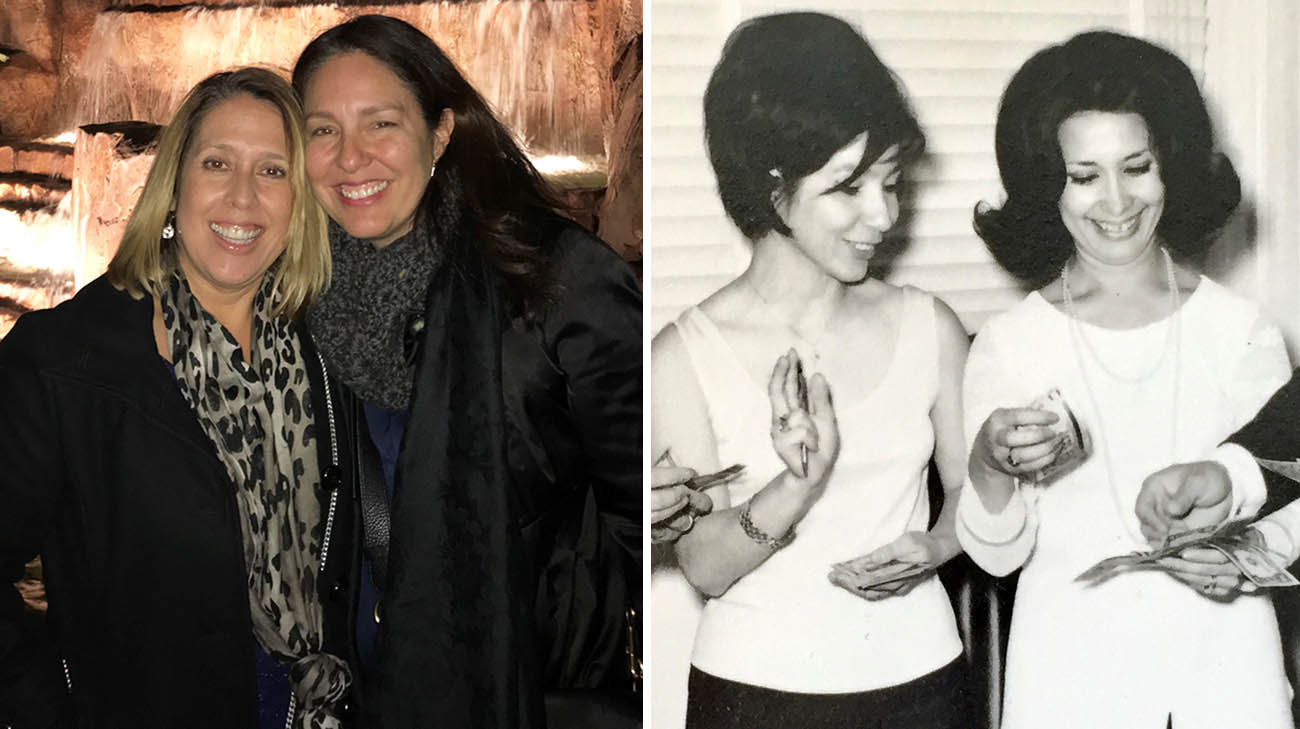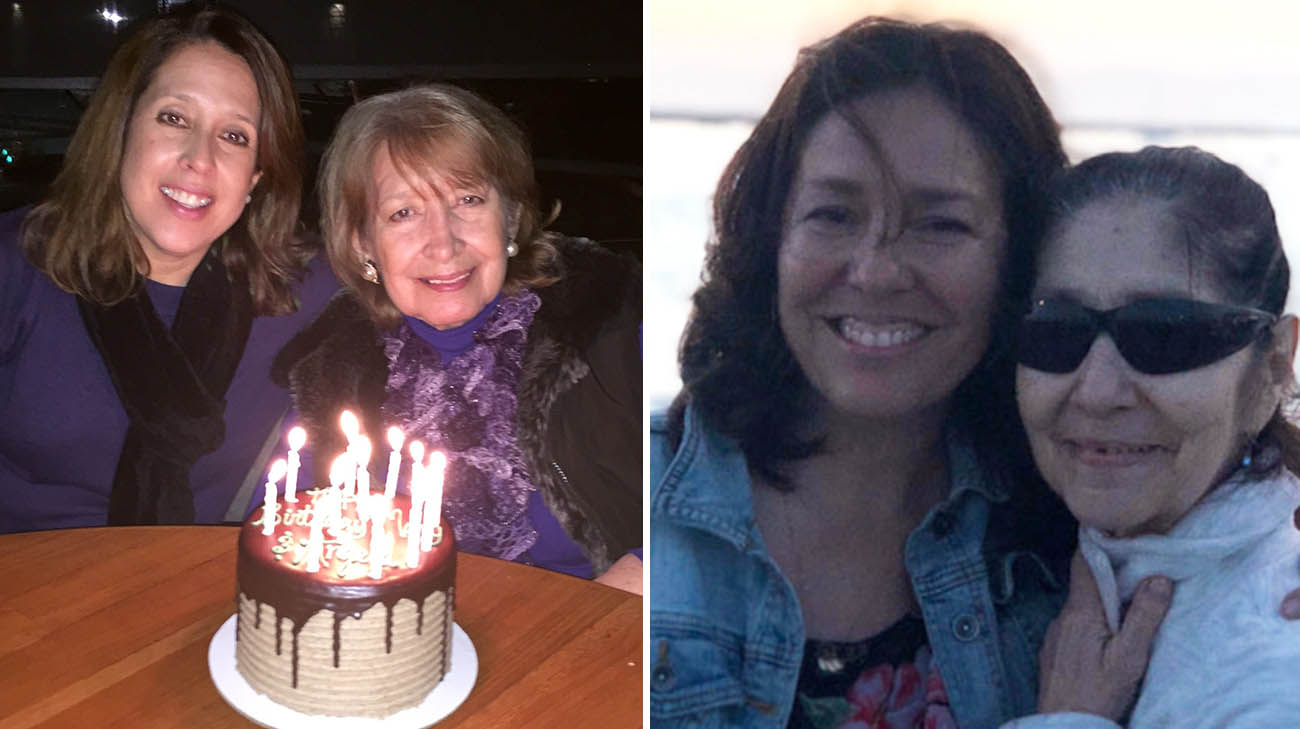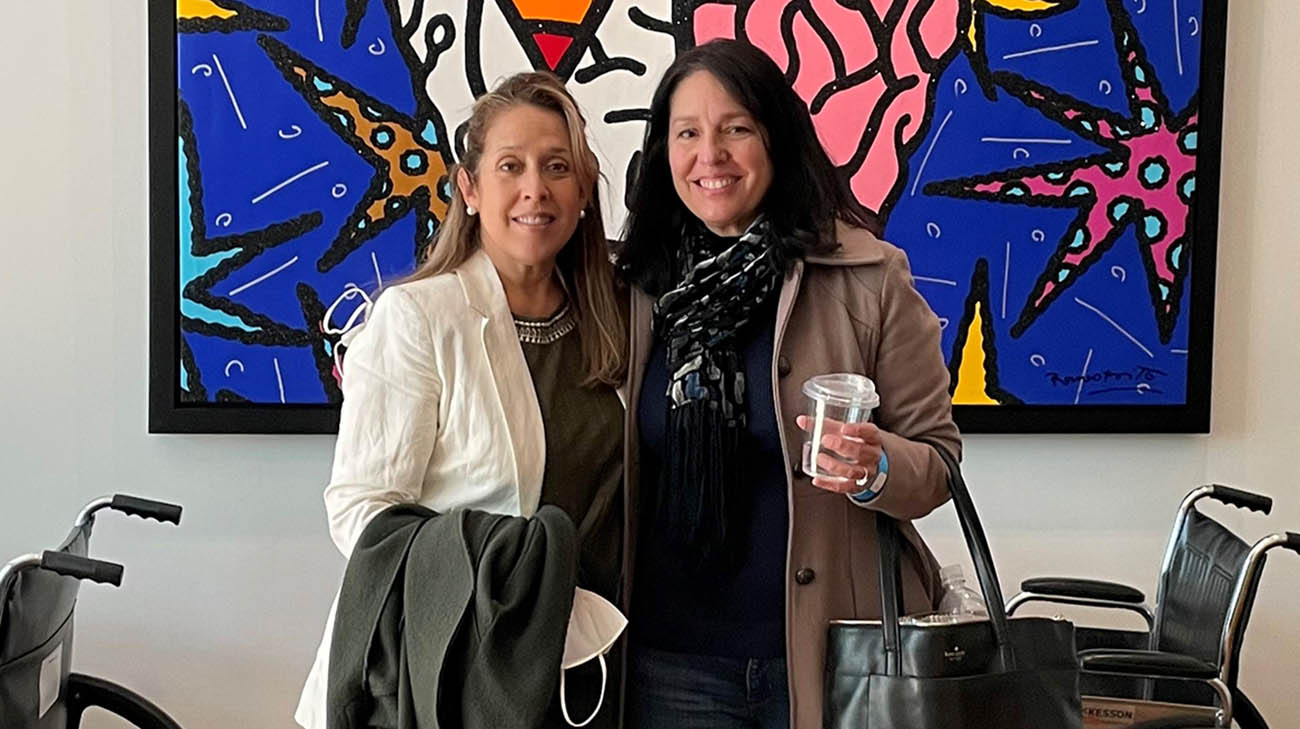
Best friends since they were kids and neighbors living in Southern California, Angela DeCuir and Michele Izquieta Cruz have always had a special bond.
Angela, the daughter of Ecuadorian and Mexican American parents, and Michele, whose mother and father were both Ecuadorian, grew up together from infancy. They commiserated as teenagers, when both sets of parents divorced, and they were raised by their strong and hard-working mothers.
As adults, Angela and Michele have experienced life’s joys together. They have also leaned on one another through challenges, as their mothers were each diagnosed with Alzheimer’s disease a few years apart.

Michele and Angela (left to right, in center) in 1969 during a get together with friends and family. Both women grew up together and lived in the same neighborhood. (Courtesy: Angela DeCuir and Michele Izquieta Cruz)
“I’m so grateful for our friendship,” says Michele, age 56, who lives in Torrance, California. “When my siblings and I decided to place my mom in a nursing home, Angela was there for us and provided the support we needed. I didn’t realize how much of a toll caregiving was taking on my own health.”
Adds Angela, also 56 and a resident of Yorba Linda, California, “Michele was supportive even before she knew Alzheimer’s would be her mom’s reality, too. I can’t put into words what it means to go through this with her. We’ve pumped each other up, and we’ve cried together.”
As they researched about Alzheimer’s disease, the most common form of dementia, Angela and Michele were shocked to learn women make up more than two-thirds of the more than six million Americans afflicted with the incurable disease. Adding to their surprise was the discovery that Black and Hispanic women are particularly susceptible to getting Alzheimer’s. Their risk is two and one-and-a-half times greater than that of White women, respectively.

Angela with her mother, Mary.(left) Michele with her mother, Michele.(right) (Courtesy: Angela DeCuir and Michele Izquieta Cruz)
More research is needed to determine why women of color are at increased risk for the disease, but the current data suggests social drivers of health including access to health care, socioeconomic status and education levels play a role.
While Angela and Michele do not fall into those risk categories, both of their mothers did. In their honor, they set out on a journey to learn everything they could about the disease and to try and change the course of their own brain health.
“We were eager to learn more about how to support someone with dementia,” notes Michele. “But we were also concerned we may one day get it as well, and we wanted to do what we could do to prevent that from happening.”
That motivation led them to the Women’s Alzheimer’s Movement Prevention Center at Cleveland Clinic, in Las Vegas, Nevada. It’s the nation’s first women-specific center for clinical Alzheimer’s disease prevention. Angela and Michele met with experts in the field who provided detailed information about their personalized Alzheimer’s risk and lifestyle choices they can be aware of and start implementing now to reduce the likelihood of getting the disease.
According to Jessica Caldwell, PhD, the center’s director, scientific research supports the notion that as many as 40% of Alzheimer’s disease cases might have been avoided if individuals had changed certain lifestyle habits earlier in life.

Angela and Michele at the Cleveland Clinic Lou Ruvo Center for Brain Health in Las Vegas, Nevada. (Courtesy: Angela DeCuir and Michele Izquieta Cruz)
“There are a number of things being researched that only impact women, such as menopause and reductions in estrogen, which directly supports memory,” says Dr. Caldwell, who also noted the impact of the APOE-4 gene in some women. “But women also tend to be more sedentary, and if they also have poor eating and sleeping habits, that may set them up for greater risk of Alzheimer’s later in life. The message is clear, it’s never too late to live a brain-healthy lifestyle. The earlier you start, the better.”
Michele’s mother, Michele, currently lives in a skilled nursing facility. Angela’s mom, Mary, passed away in 2018. Looking back, both daughters say their mothers spent little time on self-care as they worked long hours to support their children.
When both mothers began to show signs of forgetfulness or agitation, neither Michele nor Angela initially suspected Alzheimer’s. “I remember arguing with my mom, who was acting paranoid or accusing family members of things they hadn’t done,” recalls Michele. “She was so adamant, and I thought she was just being difficult. When I started to understand what was happening, I cried for a month. I grieved her and felt so much guilt for arguing with her.”
Similarly, Angela remembers her mother being forgetful, and over time, unable to continue to live alone. “I’d get frustrated with her. She was so strong-willed and stubborn,” she explains. “We would argue sometimes, really go at it. And when she was diagnosed, my heart just sank.”

Michele and her twin sons join Angela and her daughter. (Courtesy: Angela DeCuir and Michele Izquieta Cruz)
Both Michele and Angela say their mothers always put their children first and would postpone making regular visits to the doctor or dentist for themselves. After taking into account additional contributing factors including poor eating habits, numerous stress-filled sleepless nights and minimal exercise, both daughters say they see why their moms were extremely vulnerable to the effects of dementia.
While each of them has taken steps to maintain a healthier lifestyle, get plenty of rest, actively socialize with friends and regularly exercise, they worry other Hispanic women, or women of color, may not have the knowledge or resources to take similar steps. Thus, they have volunteered to participate in research projects at the center and help raise awareness for Alzheimer’s prevention, for women of color, at all risk levels.
“We’re fortunate to have access to resources, but that’s not the same situation our mothers were or other women are in,” Angela states.
Dr. Caldwell agrees education is key to helping narrow the Alzheimer’s risk gap for women of color. “Word of mouth is so powerful. As much as I’m excited to give women tools and hope they can make a change in their lives, it means a lot more coming from a member of their community. Organizations and leaders must advocate for more ways to spread the information.”
Related Institutes: Neurological Institute

